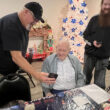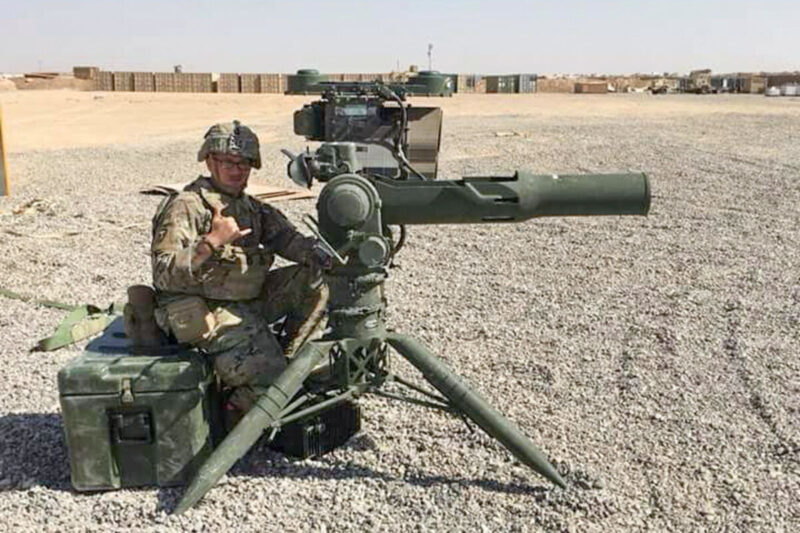Ethan Hoagland
For many who enlist, adrift and uncertain after putting high school behind them, the Army can provide a sense of belonging and purpose. Sweet Home firefighter Coury Gagne found himself among those looking for a place to fit in when he signed up in May of 2012.
“I went to school for welding when I first got done with high school and I wasn’t sure what I wanted to do with my life,” Gagne said.
His father, also a veteran, told him the Army might be a good pause button. It would turn out to be much more than a pause for Gagne.
“I went in and I really liked it, and I ended up staying for seven years.”
Gagne finished basic train ing and shipped out to Fort Drum in New York with his wife. After three and a half years, he was sent to Fort Polk in Louisiana.
“You go into something like that when you’re really young and you’re kind of, like, able to form an identity,” Gagne said. “It’s all you know as an adult. The thought of going out and getting out is scarier than staying in or even deploying or anything like that.”
In September 2015, the Gagnes welcomed their son into the world. In 2017, when Coury’s son was about 2, Coury got the news he would be deployed to Iraq. The deployment was part of the U.S. military’s initiative to train Iraqi defense forces in the war against ISIS.
Trading humid Louisiana heat for the desert, Gagne arrived at Qayyarah Airfield West for what would be about a year-long deployment.
“I was a [cavalry] scout, a 19-Delta [cavalry] scout. So our job was reconnaissance and stuff like that,” Gagne said. “We were attached to an Iraqi federal police unit.”
The swift rise of ISIS conjured anxiety and a sense of deja vu among Americans and Iraqis who still carried fresh memories of the war that toppled Sadam Hussein.
“We got this front row seat to a war that the United States was kinda like half in, half out. And we watched the Iraqis take their country back from ISIS. So that was kinda wild.”
“The Iraqis didn’t really want us to get close,” Gagne continued, “and of course we wanted to get close – a bunch of young dudes who wanted to go do war cause they didn’t understand it.”
His time deployed didn’t just bring him into close proximity with combat. It introduced him to a new world, connected him with people he may have never met otherwise and showed him how people persevere in a war-torn atmosphere.
“ISIS had blown up a lot of bridges, and so the army had built this, like, floating bridge,” Gagne said. “It was like the only place you could cross the Euphrates for maybe a hundred miles in either direction.”
“We would have to cross it every time we went on a patrol,” he continued. “There’d be, like, hundreds of people there and I’d give all these kids, like, drinks and candy and pens.”
Life carried on for his family at home while Gagne was deployed. With little opportunity for contact, Gagne only caught glimpses of his son as a 2-year-old. When he returned from deployment, he knew it was time for a change.
“When I got back I was like ‘Oh my gosh, he’s a kid now.’ When I left he was only a baby. That was, like, the main catalyst for getting out.”
Accustomed to Army life, Gagne wasn’t sure how to approach a civilian career. He considered the police department, but when that fell through, he approached Willy Sieg at Valley View Logging, who gave him a job in the mechanics shop. But there was still something missing for Gagne. After bouncing around another few jobs, Gagne found the fire station.
“I happened to be walking by the fire station, and I saw that they needed volunteers,” Gagne recalled. “So I walked in, they got me going on the track and first time I put on turnouts [firefighter’s jacket] I was like, ‘Yup. This is it.'”
Being a part of the fire crew under the leadership of Chief Nick Tyler, himself a Navy veteran, gave Gagne that sense of camaraderie he found in the military. He threw himself headlong into the job and worked his way to full-time firefighter while becoming the first full-time EMT at the station. He’s still in school at Chemeketa Community College to become a paramedic, which he says he owes to the G.I. Bill.
“I try to tell all the guys getting out, use your G.I. Bill.”
The G.I Bill provides a monthly stipend for service members, along with financial aid for college. Gagne expects to keep his skills and training right here in Sweet Home.
“I just fit here,” Gagne said. “I coach wrestling here, I go to church here, I work here and I respond on hundreds of calls to people here. So I have roots now in the community.”





